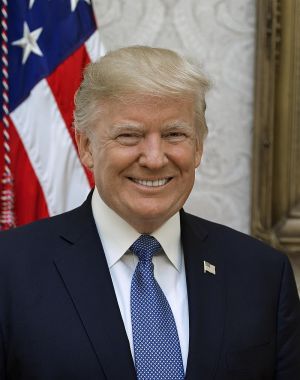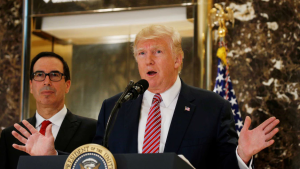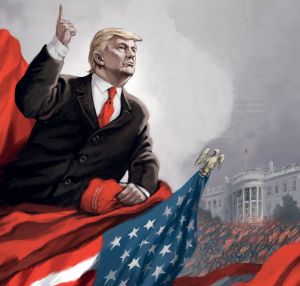The ideology of Donald Trump, often called "Trumpism," refers to the political stances taken by the former President of the United States (POTUS) Donald Trump.
Domestic policy[edit | edit source]
Alt-Right[edit | edit source]
Donald Trump is often considered a prominent member of the Alt-Right, a sociopolitical movement in the United States (US) advocating for a rejection of the neoconservative ("new" conservative) in favor of a return to an alternative conservative traditionalism and nationalistic American patriotism.[1] After Trump came to office, the Alt-Right staged the Unite the Rally rally in North Carolina to stand behind the patriotic Trump administration.[2] The Alt-Right has often been criticized as fascistic and has been called out for usage of neo-Nazi optics. Trump later disavowed the Alt-Right, joining critics in opposing its fascist rhetoric.[3]
America First[edit | edit source]
Donald Trump considers himself to be "America First" above all, supporting a pivot back towards American patriotism as opposed to a rising tendency of patriot nihilism. Trump has also pushed for ending imperialists wars in Africa and the Middle East, instead pushing for a policy of isolationism that allows American troops and American money to be used to help the American people as opposed of hurting foreign people. The America First movement has grown beyond Trump, with Nick Fuentes becoming the founder of the America First Political Action Conference (AFPAC) in 2020. Fuentes met Trump during a dinner with Kanye West in 2022.
MAGA Communism[edit | edit source]
While Donald Trump does not adhere to it publicly, MAGA Communism is a slogan developed by Haz Al-Din that promotes Trump and the MAGA movement as part of a popular front political strategy to use MAGA as a fertile soil out of which American Communism can grow. Many MAGA Communists have endorsed Trump for the 2024 American presidential election, however some have diverted and instead have embraced Kanye West's campaign or have promoted the prospect of a Tulsi Gabbard run.[4]
Maoism[edit | edit source]
Donald Trump, particularly the MAGA movement that he has constructed and led, has often been compared to the Marxist-Leninist political tendency of Maoism. This has especially been true in the way Trump's political strategy has been analyzed, with some considering it identitcal to how Mao Zedong created a popular front between the proletariat and the peasantry against the Kuomintang during the Chinese Civil War. Trump, similarly, united the American proletariat with the American exo-peasantry against the bourgeois global elite. Mao brought the Communist Party of China (CPC) into an alliance with the petty bourgeoisie to oppose foreign imperialism, whereas Donald Trump and the MAGA movement supported small business owners against the domestic imperialism of the Deep State.[5]
Paleoconservatism[edit | edit source]
According to both supporters and critics of Donald Trump, he is a paleoconservative ("older or ancient" conservative). This brings out a contradiction between Trump and the leadership of the Republican Party (GOP), which adheres to neoconservatism. While neoconservatives often work with neoliberals within the Democratic Party to further the cause of imperialism, Trump instead worked with contemporary paleoconservatives from the "Radical Republican" faction to oppose liberal interventionism. The paleoconservative movements advocates for a pivot from the mainstream line of the Republican National Committee (RNC) and instead turning to isolationism, an abolition of taxation, and a revival of American patriotism.[6] Trump, likewise, pulled out of the Middle East, introduced major tax cuts, and promoted a patriotic line within the Alt-Right.[7][8][9][10][11][12]
References[edit | edit source]
- ↑ The Alt-Right Comes to Washington
- ↑ What Happened in Charlottesville?
- ↑ Trump disavows 'alt-right' supporters
- ↑ Cite error: Invalid
<ref>tag; no text was provided for refs named:0 - ↑ Trumpism is Maoism. Trump's movement is a Maoist movement. Rural masses trump urbanite decadence and elitism.
- ↑ Paleoconservatism, the movement that explains Donald Trump, explained
- ↑ Trump Orders Withdrawal of U.S. Troops From Northern Syria
- ↑ Trump to withdraw most troops from Somalia as part of global pullback
- ↑ Trump ordered rapid withdrawal from Afghanistan after election loss
- ↑ Trump tax cuts and the middle class: Here are the facts
- ↑ The truth about Trump's tax cuts by the numbers, not by Biden: Andy Puzder
- ↑ President Donald J. Trump Is Protecting America’s Founding Ideals by Promoting Patriotic Education



